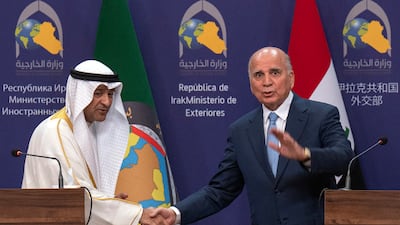Iraq and the Gulf Co-operation Council on Monday praised their “strong” relations, pledging to boost them in all fields.
Baghdad hosted a Gulf delegation led by GCC Secretary General Jassim Al Budaiwi.
Mr Al Budaiwi met Iraqi Foreign Minister Fuad Hussein and is scheduled to meet Iraqi Prime Minister Mohammed Shia Al Sudani.
“Iraqi policy is based on strengthening and widening relations with neighbouring countries,” Mr Hussein told a joint press conference.
“We discussed a number of topics related to developing the economic relations and, of course, the electricity issue was an important and sensitive one during these discussions,” he said.
In June, the GCC Interconnection Authority launched long-discussed plans to connect electricity-poor Iraq to its grid to help meet some of its growing demands for power.
“The electricity interconnection with GCC network or the Saudi Arabia was the main topic in our discussions,” Mr Hussein said.
The project is intended to begin exporting electricity to southern Iraq by the end of 2024. It will initially provide 500 megawatts until reaching its 1,800 megawatts capacity.
“We hope it will reach its final phases, especially with the interconnection with the GCC network through Kuwait to Basra [province in southern Iraq],” he said.
Iraq’s electricity demand in summer reaches more than 35 gigawatts, while its obsolescent plants and grid can produce only about 25 gigawatts, leading to lengthy power cuts and the use of contaminating and expensive private diesel generators.
Mr Hussein called on Gulf companies to invest in Iraq mainly in the gas and petrochemical sectors, adding that they have discussed ways to protect investments in Iraq.
“We encourage Gulf companies to invest in Iraq. We need the Gulf investments and companies in Iraq,” he said. “Iraqi doors are open to the Gulf companies”.
Iraq has “clear plans and vision with regards to the Iraqi-Gulf relations, and our duty is to develop and protect them”, he said.
The Gulf-Iraqi Economic Forum is scheduled to meet on September 27-28 in Sharjah to explore opportunities between the Iraqi government and the private sector in Gulf states, Mr Al Budaiwi said.
“We are looking forward to this forum to be the cornerstone for strong relations and boost them between the Iraqi and Gulf sides as well as their private sector,” he said.
“The future is glamorous and wonderful for Iraqi-Gulf relations,” Mr Al Budaiwi. “The way is paved and the intentions are sincere, and we all want to take these relations to wide horizons to benefit the brotherly Iraqi and Gulf peoples.”
Relations between Iraq and GCC have improved in recent years after they were severed following the invasion of Kuwait by Saddam Hussein in 1990.
Subsequent to the 2003 US-led invasion that toppled Saddam’s regime, GCC governments dealt with the new pro-Iran government in Baghdad with caution.
But in recent years, relations started to improve with GCC governments reopening their embassies and exchanging visits by senior delegations.


